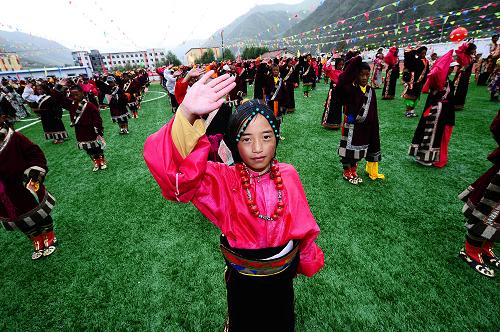

As the temperature continues to drop on western China's Qinghai-Xizang Plateau, local school children still look forward to dancing during their recess. While in Brazzaville, capital of the Republic of Congo, artists are beating drums with passion as if summer never ends.
Though geographically far apart, the two peoples, both of whom have a rhythmic soul and habitually resort to dance and music, have always extended a helping hand to each other, creating a tale of friendship between China and Africa.
Tibetan woman Cewang Pasang, 20, was still emotional when recalling the day an earthquake hit her hometown, the Yushu Tibetan autonomous prefecture, Qinghai province, 11 years ago.
In April 2010, a 7.1-magnitude earthquake struck Yushu. She and her friends were safe, but had to spend freezing nights in tents with their school badly damaged by the disaster. "I felt like I had lost my home. I dreamed of reading on my own desk again," she says.
To them, the school was not merely a place to get an education, it was more of a sanctuary for her and her schoolmates, many of whom are orphans.
While attending the Shanghai World Expo in 2010, Denis Sassou-Nguesso, president of the Republic of Congo, expressed his country's willingness to rebuild a primary school in the quake-hit area, at whatever cost.
In July 2012, the restoration of Cewang Pasang's school was completed under the new name of the Sino-Congolese friendship primary school. "Although our economic capacity is limited, we should extend help," Basile Ikouebe, then-foreign minister of the Republic of Congo, said at the ceremony to celebrate the completion of the construction.
Despite pouring rain, Cewang Pasang put on her robe and performed the Tibetan circle dance with her friends, representing the highest tribute of her culture, in front of the African guests. "I tried to dance the best I could as a way to say thanks," she says.
Ten years after the earthquake, the COVID-19 pandemic is ravaging the world. In February 2020, when China was battling hard against the virus, Pointe-Noire, the second largest city in the African country, donated 10,000 medical protective masks to their sister city Suzhou in eastern China. "We are convinced that you will come out as a winner," reads a letter written by the mayor Jean Francois Kando.
And when the African country faced challenges, China did not hesitate to reach out. On May 23, a 12-strong team of Chinese medical experts arrived in Brazzaville to reinforce the country's fight against the pandemic.
Inspired by the joint battle against the coronavirus, Moukila Ngalipe Tessia Harmanie, a Congolese singer, made a song, Congo, China, Hand in Hand, with Babingui Tambour, a local drum band, telling a story of solidarity.
"The Congolese love music. Our lives would be impossible without music," the singer says.
Zoubakela Destin, head of the tambour band, says in Chinese: "We've got medicine from China to help us battle the virus. What can we musicians do to thank China? We composed this song. Let's go forward, hand in hand, and prevail over the virus together."
As the year 2020 came to an end, China and Africa are seeing a new starting point in their relations.
On Jan 1, the African continent started trading under the African Continental Free Trade Area, or AfCFTA, agreement.
Amid growing expectations toward continental integration, analysts say the AfCFTA implementation is expected to further tap business opportunities China is enjoying with Africa.
Last week, State Councilor and Foreign Minister Wang Yi made his official visits to Nigeria, the Democratic Republic of Congo, Botswana, Tanzania and Seychelles, continuing a long-standing tradition of choosing Africa as the destination of Chinese foreign ministers' first overseas tour each year since 1991.
As observers expect a brighter future for China-African relations, the story of the Tibetan kids and Congolese artists is also to be continued for the next chapter.
"I long to visit the mysterious African country one day, maybe a backpacking trip when I'm in college," says Cewang Pasang.
Destin, who has been passionate about the Chinese culture since middle school, adds: "I can't wait to bring my tambour to China."